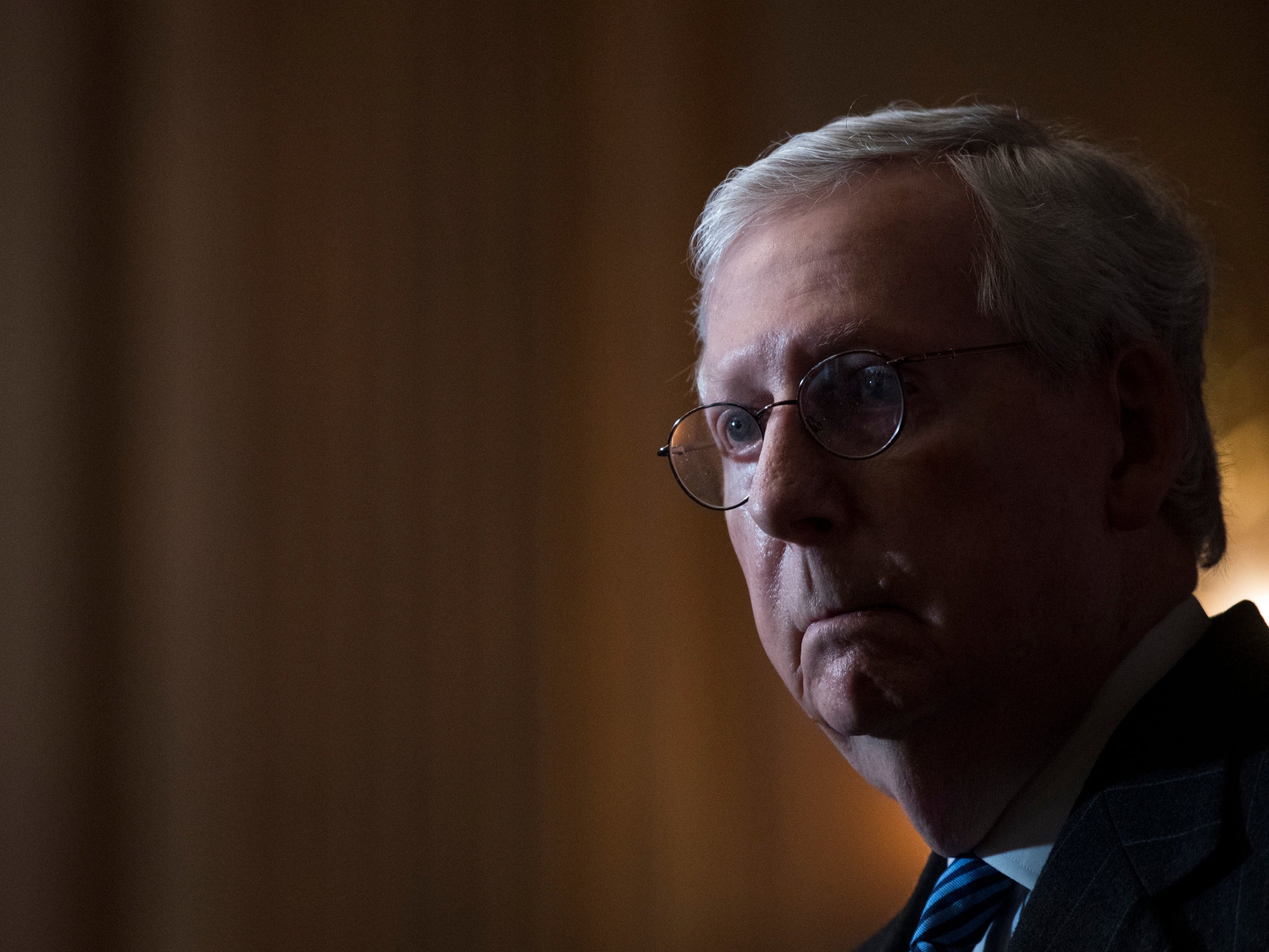How Donald Trump lost Mitch McConnell – and is preparing his payback
The majority leader’s increasing independence from Trump, however, could backfire in a big way come November 2022, writes Washington Bureau Chief John T Bennett


Where is Mitch McConnell’s breaking point?
That was a question asked for half a decade in Washington – and even beyond the DC Beltway as the country and world wondered why the Senate majority leader tolerated Donald Trump and his bombastic approach.
The Kentucky Republican, seen as the scion of the so-called “GOP establishment”, rarely broke with or even criticised Mr Trump’s most bombastic statements or tweets or policy actions. He mostly humoured the populist president’s threats about this or that piece of legislation, opting instead to guide Mr Trump towards signing those bills once the Senate sent them to his desk.
The short answer to that four-year-old question was fairly simple: It’s the judges, stupid – in another version of former Clinton adviser James Carville’s line about the economy and politics.
The team of Mr Trump and Mr McConnell have put over 200 new jurists on federal benches from coast to coast. That is one in every four federal judges.
Mr McConnell and several conservative organisations would send over lists of names, mostly all young and ideologically right-leaning, to the White House. Mr Trump and his team mostly rubber-stamped those names and nominated them with the assurance the GOP-run Senate would confirm them.
But with only 20 days left for Mr Trump’s term, the majority leader has slowly begun distancing himself from the soon-to-be former president.
The parade of conservative judicial nominees has all but come to an end. Mr McConnell appears to know his transactional relationship with Mr Trump is not one-sided.
In short, Mr Trump was once a useful-if-wildcard partner who now has little to offer Mr McConnell.
If the majority leader believed he needed Mr Trump’s help a day longer, he would not have tied his demand for increasing direct Covid stimulus payments to $2,000 (from $600 in existing law) and repealing legal protections for social media firms the president claims are censoring him and other conservatives.
Yet, that’s exactly what he did before adjourning the Senate session on Tuesday afternoon. He lacks the votes for that Frankenstein of a bill, meaning he is choosing to hand the president a major defeat on the way out the door.
The top Senate Democrat, Chuck Schumer, said that if Mr McConnell tied the larger checks, which his party also wants, to the other two issues, he would be “loading up” the bill “with unrelated, partisan provisions that will do absolutely nothing to help struggling families across the country”.
“Any move like this by Sen McConnell would be a blatant attempt to deprive Americans of a $2,000 survival check,” he added.
But in purely political terms, it was a blatant message to Mr Trump: Thanks for your help, Mr President. We’ll take it from here.
“This week, the Senate will begin a process to bring these three priorities into focus,” Mr McConnell said Tuesday morning in his opening remarks. Longtime McConnell observers knew instantly the man who talked about “making a law” for weeks in pressuring Democrats to strike a year-end spending and Covid relief bill was not interested in doing that this week.
Mr McConnell also, on his caucus’s final conference call of the year, urged his members to avoid any urge to join House conservatives on 6 January by challenging President-elect Joe Biden’s Electoral College victory.
The GOP leader’s plea drew this presidential rebuke via a 26 December tweet: “If a Democrat Presidential Candidate had an Election Rigged & Stolen, with proof of such acts at a level never seen before, the Democrat Senators would consider it an act of war, and fight to the death. Mitch & the Republicans do NOTHING, just want to let it pass. NO FIGHT!”
But Mr McConnell’s growing independence has helped make a big risk a reality. It only seemed to anger the president, who has kept up his daily badgering of GOP senators to join the objections. One did on Wednesday, Missouri’s Josh Hawely.
What now seems likely is a joint session of Congress that will meet on 6 January to certify the Electoral College result will be forced to split up.
The House and Senate then will spend several hours in their respective chambers hearing arguments for and against the challenge(s). They will each then vote on whether to uphold or reject the objections.
Only that Mr Hawley and the House conservatives are expected to fall well short of the two-thirds majorities needed in each body. The roll call results will hand Mr Trump a list of GOP members who vote against the challenges to target with more-conservative candidates in 2022 GOP priorities.
And that could cost Mr McConnell his majority – or a narrow one with a hard-to-control caucus with a feisty class of conservatives. That did not end well for now former Speaker John A Boehner, who was essentially pushed out by his caucus’ conservative Freedom Caucus faction.



Join our commenting forum
Join thought-provoking conversations, follow other Independent readers and see their replies
Comments